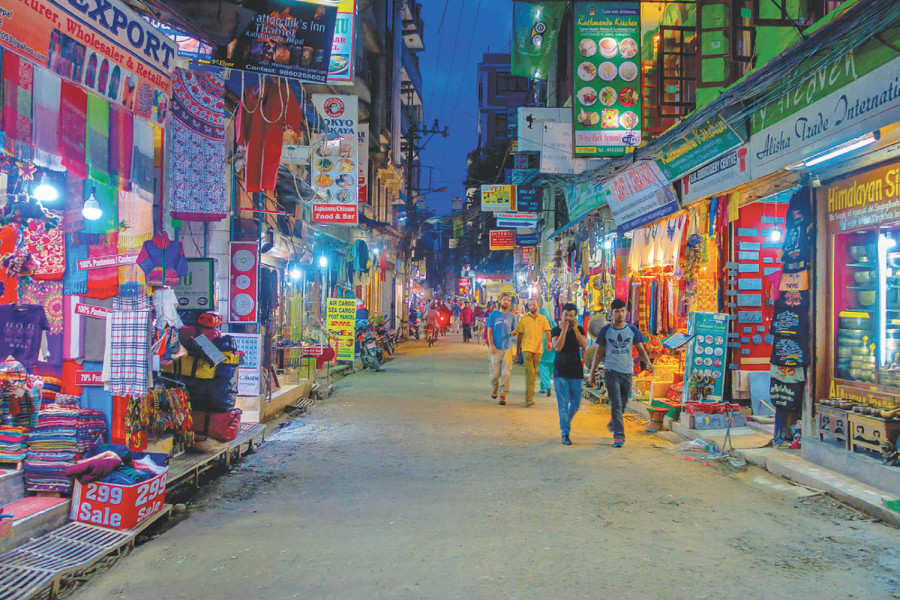Money
Nepal opens nighttime business to boost its ailing economy, tourism income
Economists say although it’s a landmark decision that would increase tourist spending, the policy is still restrictive.
Sangam Prasain
After almost a decade and a half, the Nepali authorities have adopted a “liberal policy” to allow nighttime businesses across the country to flourish, thereby giving a boost to economic activities.
Kathmandu’s chief district officer Ghanshyam Upadhyay said that they have fixed the time for conducting various nighttime businesses in the capital, Kathmandu.
As per the decision, the liquor shops are now allowed to stay open till 10 pm. Similarly, restaurants have been permitted to open until 12 midnight and the dance bars and clubs are allowed to operate till 4 am.
Economists say it’s a landmark decision because the local economy benefits a great deal from a vibrant nightlife. But the policy is still restrictive.
“The decision to allow the businesses to remain open for longer will promote tourism as well as increase job opportunities in the country,” said Upadhyay.
Since the start of the Covid pandemic, Nepal is going through an economic slowdown with most of the economic indicators remaining below par. The situation has further been exacerbated by the Russia-Ukraine war, which has fueled inflation across the world.
As a result, tourist movement has slowed down globally, including to Nepal.
Nepali authorities for a long time have been averse to nighttime businesses, citing various reasons, including security.
The Ministry of Home Affairs has also permitted nighttime business across the country, depending on the security situation prevailing in the districts.
“We have informed all the security agencies across the country to provide security for businesses, those who wish to remain open during the night,” said Basanta Bhattarai, assistant spokesperson for the Home Ministry. “Based on the request of the businesses, the security agencies of the respective districts will make necessary arrangements to allow the businesses to operate during the night.”
“The nighttime business should be operated in a safe manner,” Bhattarai added.
Usually, the country goes to sleep by 7 pm, while the capital city retires by 8 pm, which effectively means no business during the night.
Throughout its long history, nightlife has been central to Thamel’s identity, but except for a few bars, it usually goes off to sleep before the clock strikes 10. The authorities say shops, restaurants and bars have to be closed by 10 pm, for security reasons.
The decade-long insurgency (1996-2006) that killed 17,000 people heightened security concerns across the country. Security was beefed up during the second people’s movement in 2006. Logistically, until mid-2017, the country was facing acute power outages, up to 18 hours a day. All these events had a profound impact on nightlife tourism in Nepal.
The situation, however, has improved and things are far better now. After ending a long-drawn transition, the country is on the cusp of economic expansion and it relies heavily on tourism.
Nepal’s civil aviation body has opened most airports in the Terai plains until midnight, which means they operate 18 hours a day.
Seven of the nine airports in the country’s southern plains are now capable of handling night flights after being equipped with area navigation technology. In the past, the lack of technology forced domestic airlines to call it a day after 5 pm.
Keeping the airports open longer means more business for shops, restaurants, hotels, taxi operators and public vehicles, which together would boost the country’s economic output, say travel traders and economists.
“It’s a welcoming decision. I would say, it’s a landmark decision,” said Keshav Acharya, a senior economist. “But still, the decision is restrictive.”
Kathmandu and other major cities of Nepal are seriously lacking in nightlife, which is a major spending avenue for tourists across the world.
“Nepal’s key economic agenda is to increase the tourist numbers, but we forced the businesses to close by 10 pm. This is the way we were promoting tourism, earlier,” said Acharya. “Definitely, the nighttime business revenue is high. If we become open and allow business activities 24/7, it would increase job opportunities.”
Nepal’s tourism sector generated Rs161.7 billion in revenue and supported nearly 1.06 million jobs directly and indirectly in 2021, according to the annual World Travel and Tourism Council research report. The contribution of the tourism industry to the country’s gross domestic product last year stood at 4.3 percent.
Acharya said that an accessible transportation system, trained manpower like taxi drivers and enhanced security would make the Nepali economy vibrant. “It will also send a positive message to the foreign investors that Nepal has become an open society and its security has been enhanced.”
In Kathmandu, ride-hailing apps like Pathao, InDriver and others have become a boon for travellers during both daytime and nighttime.
Though no studies have been done on the economic impact of nightlife, tourism industry insiders say tourists spend double during the nighttime as compared to daytime.
In early 2014, the government announced keeping Thamel and Durbarmarg open round-the-clock in order to encourage tourism-related businesses. Before that, Thamel used to operate until midnight.
But a certain group went to court against the government’s move, because there is no clear demarcation between residential and commercial areas in Thamel and certain people claimed that it will affect the harmony of the residential areas with noises emanating from the night clubs. The court then ordered Thamel to open only until 2 am.
The properties that have proper lighting and sound-proofing systems in their clubs are the ones allowed to open until 2 am.
Tourism entrepreneurs have been raising their concerns over the low spending of tourists. According to statistics from the Tourism Ministry, the average spending per tourist per day last year dropped to $48, from $65 in 2020.




 9.7°C Kathmandu
9.7°C Kathmandu















